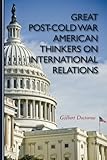Great post-cold war American thinkers on international relations / Gilbert Steven Doctorow
Language: Spanish Publication details: [Seattle, Wash.] : [2010]Description: 217 pages ; 23 cmISBN:- 9781453764473
- 145376447x
- JX 1305 D637g 2010
| Item type | Current library | Home library | Collection | Shelving location | Call number | Copy number | Status | Date due | Barcode |
|---|---|---|---|---|---|---|---|---|---|
 Libro
Libro
|
Biblioteca Juan Bosch | Biblioteca Juan Bosch | Ciencias Sociales | Ciencias Sociales (3er. Piso) | JX 1305 D637g 2010 (Browse shelf(Opens below)) | 1 | Available | 00000121088 |
A study of the writings of the 10 most widely read and influential American foreign policy theorists/practitioners during the post-Cold War period, 1992-2008, including Francis Fukuyama, Zbigniew Brzezinski, Henry Kissinger, Sam Huntington, the Neoconservative Robert Kagan and the 'dissident' Noam Chomsky. The collapse of Communism in 1992 was arguably more disorienting for the United States' foreign policy establishment than for the vanquished foe and there was an immediate thirst among politicians and in the general public for an interpretation of the new international landscape and for road maps into the future. The authors under examination rose to the challenge and satisfied the demand for new visions, new paradigms with greater or lesser success. The issues they flagged and their policy recommendations continue to shape the debate on Capitol Hill today. Nine of our ten authors have in common a significant affiliation with Harvard University. Though independent minded and individualistic, they line up along a divide between 'realists' and 'idealists' which gave tight focus to their debates. What results is a tableau of American intellectual history in the period


There are no comments on this title.